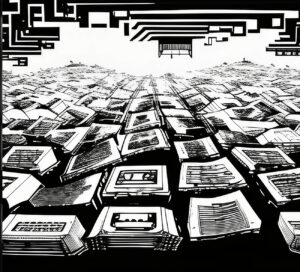NFTs as In-Game Purchases: Digital Assets in Focus
In the sprawling kingdom of the gaming industry, a grand revolution unfolded. Its herald was none other than the emergence of non-fungible tokens, known far and wide as NFTs. NFTs possessed the power to alter the very fabric of gaming, captivating both players and creators in their grasp.
NFTs brought about a paradigm shift, breathing new life into the notion of digital ownership and bestowing boundless economic opportunity. These unique digital treasures unveiled a vast expanse of possibilities, rewriting the rules of in-game purchases and changing the entirety of the gaming landscape.
What are NFTs, and how do they work in gaming?
NFTs are one-of-a-kind digital tokens that symbolize ownership of a specific item or piece of content. Unlike the interchangeable nature of cryptocurrencies like Bitcoin or Ethereum, NFTs exude an indivisible and irreplaceable quality, possessing distinct properties and attributes that distinguish them with unparalleled uniqueness.
NFTs hold immense potential to revolutionize the gaming industry by enabling true ownership of in-game assets. In the past, avid gamers would invest in virtual items like skins, weapons, or characters, yet they were merely temporary possessions devoid of tangible control or genuine ownership. With NFTs, players can now buy, sell, and trade digital assets with actual value.
When a game integrates NFTs, in-game items or assets are minted as unique tokens on a blockchain. Subsequently, these tokens can then be bought, sold, or exchanged on decentralized marketplaces. Crucially, the blockchain serves as an immutable ledger that meticulously records the ownership of these assets, ensuring transparency and security.
The upsides of NFTs in gaming
True ownership: NFTs bestow upon gamers an unparalleled sense of genuine ownership and control over their in-game possessions. Comparable to the tangible world, players can freely engage in buying and selling NFTs on the expansive open market like physical objects.
Interoperability: NFTs transcend the confines of individual games and platforms, ushering in a new era of seamless interoperability. For instance, a rare sword acquired in one game could be used in another compatible game, elevating its value and versatility.
Player-driven economies: NFTs empower players by enabling them to participate in player-driven economies. Gamers wield the power to craft, trade, and sell their own in-game assets, giving rise to new economic opportunities and revenue streams.
Rarity and scarcity: NFTs allow for the creation of rare and limited-edition artifacts within games. This scarcity adds value to these items and creates a sense of exclusivity, motivating players to immerse themselves more fervently in the game.
Developer incentives: NFTs provide game developers with an innovative avenue for monetizing their creations. Through the sale of NFTs, developers gain the ability to generate revenue and support ongoing development and maintenance of the game.
The future of NFTs in gaming
NFTs have already made a significant impact on the gaming industry, and the boundless possibilities are still being explored. In the future of gaming, NFTs will unleash a rush of innovative experiences, where players will be the architects of their digital destiny.
But it’s not just players who will benefit. NFTs will empower developers to revolutionize the creation and distribution of games. With NFTs, they will have the means to fund projects through token sales or crowdfunding, providing new avenues for financial support and community engagement.
The future will witness an explosion of user-generated content as players create and mint their own NFTs within gaming ecosystems, breathing life into their wildest imaginations. Artists, musicians, and storytellers will find a flourishing platform within the gaming sphere, as NFTs enable them to showcase and monetize their creations directly to an engaged and passionate audience.
The future of NFTs in gaming is a saga yet unwritten, but its potential for transformation is promising and exciting. We’re on the cusp of a whole new era that could completely change the way we play and experience games.





